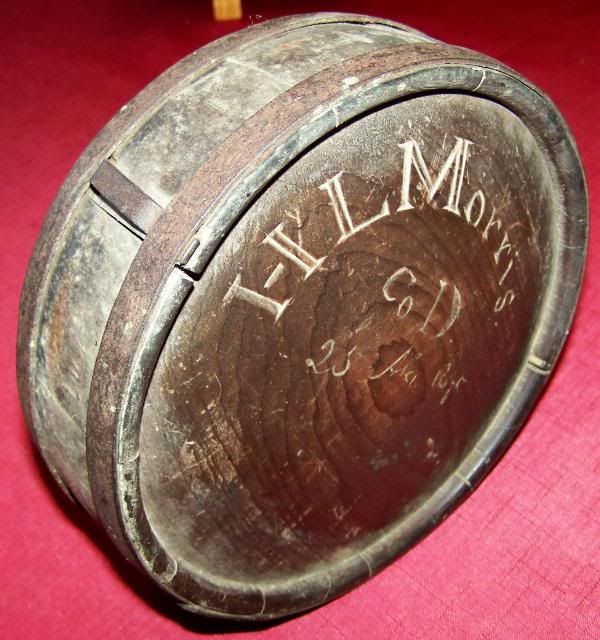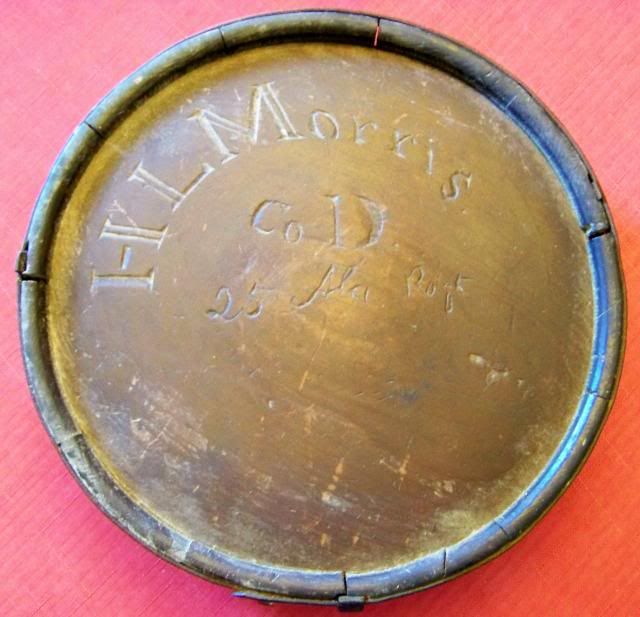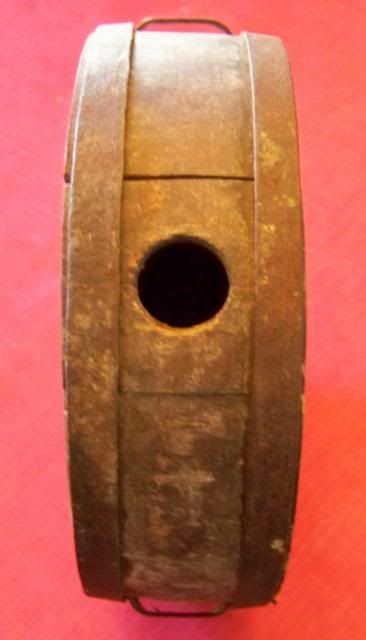


A lady gave it to my Sister-in-law
Found in a fence row in Coffee County, TN and kept in a closet for well over a hundred years. The family that had it was somewhat paranoid about letting anyone see it. H. Lewis Morris was the Captain of Co. D and fought through out the entire war with the Army of Tennessee. The Co. was raised in St. Claire County, AL and mustered into service at Mobile. This canteen has never been viewed by the public or photographed.
A little about the 25th.
It was formed in Mobile, in December, 1861 by consolidating the 1st and 6th (McClellan's) Alabama Infantry Battalions. The men were from the counties of St. Clair, Talladega, Pickens, Shelby, Calhoun, Randolph, Coffee, and Pike. Sent to Tennessee, the regiment was assigned to Gen. Gladden's Brigade, but due to illness had only 305 effectives at Shiloh. It saw little action in the Kentucky Campaign under General Gardner, then was attached to Gen Deas', G. D. Johnston's, and Brantley's Brigade, AOT. The 25th participated in the difficult campaigns of the army from Murfreesboro to Atlanta, fought with Hood in Tennessee, and was engaged at Kinston and Bentonville. it reported 90 casualities at Shiloh and 117 at Murfreesboro. This unit lost 33% of the 330 at Chickamauga, and in Dec. 1863, totaled 304 men and 174 arms. 41% of 273 were disabled in the Battle of Atlanta, and13% of 173 at Ezra Church. it surrendered with 70 officers and men.
Capt. Morris was 6 ft. tall, grey eyes and light hair and skin (according to his records).
He joined as a lieutenant was commissioned as a captain on March 1, 1862. He was in camp at Corinth,MS with Gen Bragg on April 1, 1862. Was absent "sick" in June, 1862, then back with company on duty in July and Aug, 1862.
He was severely wounded in operations before Murfreesboro, TN on December 31, 1862 in the first charge. He was found among the wounded by the Union forces at Stone's River.
Listed as a POW at Murfreesboro on Jan. 5, 1863, sent to Camp Chase on March 24, 1863. Transferred to Fort Delaware April 10, 1863 and forwarded to City Point, VA for exchange on April 29, 1863.
On Sept 2, 1863, he was back with his unit and was commended for "Faithful in Discharge of Duty".
He was sent to hospital sick on October 2, 1863 by order of the camp surgeon.
he was back with unit listed as Inspector and Mustering Officer for Nov-Dec 1863.
Next report is in the field at Atlanta in August, 1864 on "sick" report
he was at Lovejoy Station, GA in September, 1864 on "sick" report.
He was wounded andcaptured again in March 1865 and listed as a POW at Talledega in June, 1865.
After the war there was some question about a courts martial that Capt. Morris sat on, and this statement was given on his behalf.
Captain Lou Morris
Company D
I have retained through the long years, the kindliest memory of this manly man and loyal soldier of the Lost Cause. In the first year of the war and after the resignation of Capt. Nixon who raised Company "D" at Ashville in St. Clair County, Capt. Lou Morris of that Company was put in command and remained so till the end of the war.
No man of the regiment, officer or private, met with more manly courage and gave more loyal support to the cause for which we were fighting than did this young gallant officer. He was among the few soldiers who allways was neat and tidy in his person and apparel and was extremely popular with the men and officers on account of his fine social and manly qualities. And one never heard it hinted, that Capt. Morris was wanting in any of the qualities which made up a gallant and brave soldier.
I will here relate a little incident, which I distinctly remember. Just before going into Kentucky and while the regiment was in camp in 1862 at Tyner's Station, not far from Chattanooga (we were there several weeks). We were in camp at an old Methodist Campground and the company officers were required to meet each day about 10 o'clock under an old arbor, to recite before the Colonel a lesson in military tactics. And while in camp there, I missed or lost a $20 bill, but having plenty of Confederate money, I took but little notice of it (my salary as Capt. was $125 per month).
I suppose it was a year or more after this, Capt. Morris and I were one day talking about our experiences in the war and the conversation turned on the loosing of money out of our pockets. I incidently remarked that the only money I had ever lost in the army was when we were in camp at Tyner's Station near Chattanooga in the fall of 1862. His reply was that "I found a $20 bill under that old arbor where we recited our lessons in tactics while we were there and I guess it is yours" and handed me a $20 bill.
Capt. Morris went to Texas soon after the war and settled at Jacksonville, Texas where he died two years ago.


Comment